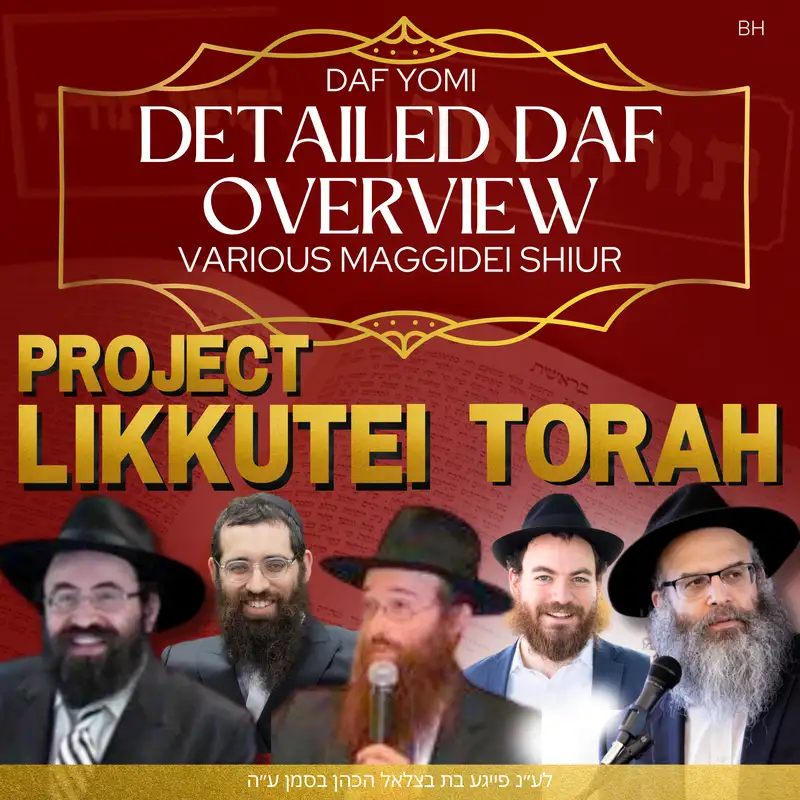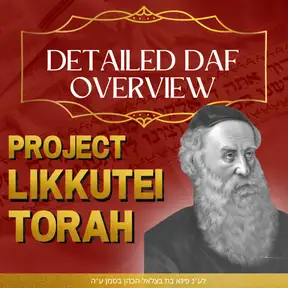
Torah Ohr Daf 103 - Yosef's Sword and Bow w/ Rabbi Dovid Leib Shmerling
Summary
To sponsor an entire week of content, please email projectlikkuteitorah@gmail.comSummary Daf 103 Torah OhrJoseph and the other tribes had different sources and different roles. Yosef’s soul is from higher, from Atzilut, his role is to counteract Paraoh and his ministers. Hence why he was given ‘shechem ehad al aheicha‘ beyond his brothers because of his higher source. 2 ways to do this - the sword and the bow. Onkelos translates prayer and beseeching. This corresponds to close combat, i.e. what can be achieved through Shema - 248 including 3 words repeated twice - gematria romach (a spear). What can help us with evil/ego right in front of us, separating us from Hashem? The shema! When we think about Hashem’s oneness, that negates us being separate from Him. But when it’s more subtle (further away), we need a bow, i.e. beseeching. The idea being - when there’s something we need, and we need to ask for help, we need to humble ourselves and bring ourselves low. Which is the idea of the humble asking help of Hashem in the Shemoneh Esrei prayer. This reaches further than the sword/Shema, to get rid of further away evil/concealment of Gdliness.Next maamer [on the same topic]:Yosef is clearly higher than the other tribes, but they didn’t realize this since they are from within the limited worlds looking up to Hashem, and Yosef is from atzilus, is looking down from the world of clear Gdliness, to gift and help. They’re trying to refine from within (the name ‘Bahn’ in kabbala - 52) and he’s trying to refine from above (shem ‘Mahn’ - 45). Hashem is beyond all description/details in His essence, but us calling Him (wise, kind, merciful, etc.) by a name creates that reality. Only at the state of malchut can there be something independent outside of Hashem (e.g. calling Him by a name). Therefore this is where Tohu (the shattered world of chaos as explained elsewhere) comes from. Beyond malchus there is only pure Gdliness (Yosef), and the shvatim are the extension of malchus into the lower worlds called BYiA. However, Yosef can have a disadvantage, which is that when deeply concentrated on something, or far from anything external, they lack awareness of that external world, much like an unnoticed spider making a web in a palace. When the light is directed downward, by contrast, to be received in a limited amount in a specific way in a container for it, then it won’t veer off externally to where it doesn’t belong (i.e. blocking the energy of Paraoh that Hashem’s light should only come down to where it belongs… the story of the Exodus from Egypt). And thereby we could have Matan Torah (giving of the Torah - Hashem’s will and desire)… As a result of Hashem’s energy only going where it should. If there was only desire beyond detail, this wouldn’t matter. Hence why Yosef’s job is to ensure that Paraoh is blocked off. Support the showTo sponsor an entire week of content, please email projectlikkuteitorah@gmail.com
Summary Daf 103 Torah Ohr
Summary Daf 103 Torah Ohr
Joseph and the other tribes had different sources and different roles. Yosef’s soul is from higher, from Atzilut, his role is to counteract Paraoh and his ministers. Hence why he was given ‘shechem ehad al aheicha‘ beyond his brothers because of his higher source. 2 ways to do this - the sword and the bow. Onkelos translates prayer and beseeching. This corresponds to close combat, i.e. what can be achieved through Shema - 248 including 3 words repeated twice - gematria romach (a spear). What can help us with evil/ego right in front of us, separating us from Hashem? The shema! When we think about Hashem’s oneness, that negates us being separate from Him. But when it’s more subtle (further away), we need a bow, i.e. beseeching. The idea being - when there’s something we need, and we need to ask for help, we need to humble ourselves and bring ourselves low. Which is the idea of the humble asking help of Hashem in the Shemoneh Esrei prayer. This reaches further than the sword/Shema, to get rid of further away evil/concealment of Gdliness.
Next maamer [on the same topic]:
Yosef is clearly higher than the other tribes, but they didn’t realize this since they are from within the limited worlds looking up to Hashem, and Yosef is from atzilus, is looking down from the world of clear Gdliness, to gift and help. They’re trying to refine from within (the name ‘Bahn’ in kabbala - 52) and he’s trying to refine from above (shem ‘Mahn’ - 45). Hashem is beyond all description/details in His essence, but us calling Him (wise, kind, merciful, etc.) by a name creates that reality. Only at the state of malchut can there be something independent outside of Hashem (e.g. calling Him by a name). Therefore this is where Tohu (the shattered world of chaos as explained elsewhere) comes from. Beyond malchus there is only pure Gdliness (Yosef), and the shvatim are the extension of malchus into the lower worlds called BYiA. However, Yosef can have a disadvantage, which is that when deeply concentrated on something, or far from anything external, they lack awareness of that external world, much like an unnoticed spider making a web in a palace. When the light is directed downward, by contrast, to be received in a limited amount in a specific way in a container for it, then it won’t veer off externally to where it doesn’t belong (i.e. blocking the energy of Paraoh that Hashem’s light should only come down to where it belongs… the story of the Exodus from Egypt). And thereby we could have Matan Torah (giving of the Torah - Hashem’s will and desire)… As a result of Hashem’s energy only going where it should. If there was only desire beyond detail, this wouldn’t matter. Hence why Yosef’s job is to ensure that Paraoh is blocked off.
★ Support this podcast ★
